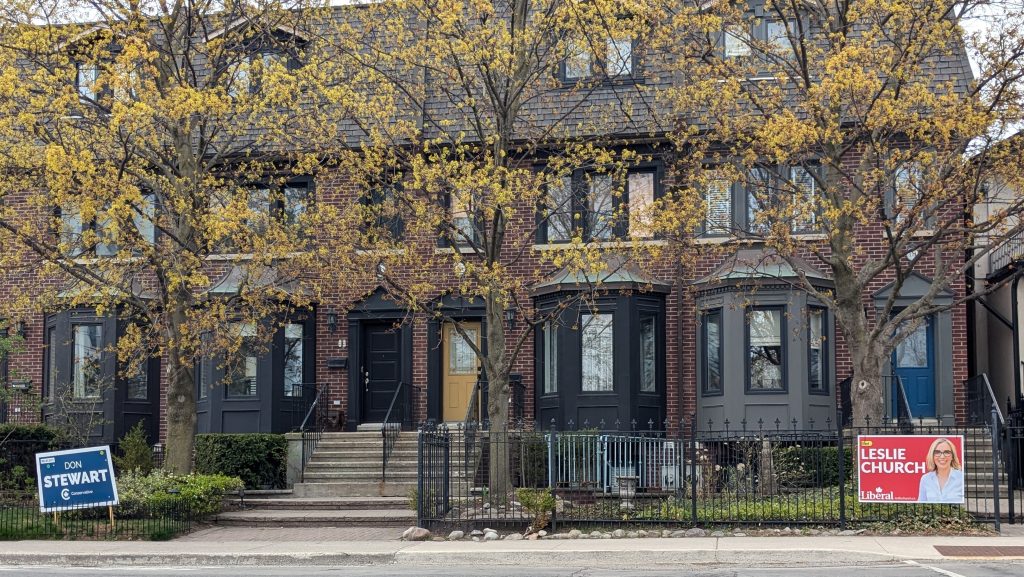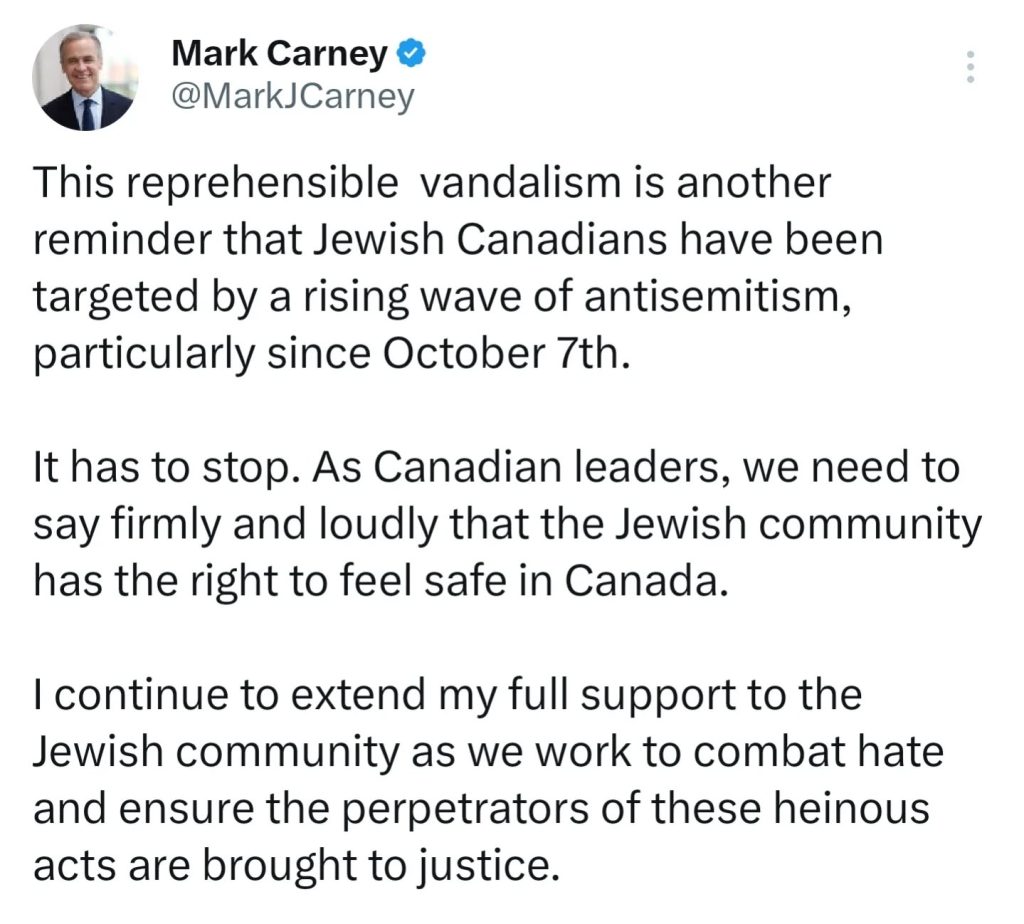Correction: 5/18/2025: This story has been edited to correct Ya’ara Saks’ voting record. Parliament did not consider a motion recognizing a Palestinian state.
How much did the preferences of Jewish voters affect the outcome of Toronto-area seats in Canada’s 45th federal election? It depends on who’s answering the question.
Ya’ara Saks, who was a Liberal cabinet minister and the first Israeli-Canadian in Parliament, lost the York Centre race to Roman Baber—a Conservative who previously served the riding for Doug Ford’s Ontario PCs, until he was expelled from caucus.
But in the midtown riding of St. Paul’s, the Conservative MP who surprisingly won a byelection last summer lost in a rematch: Don Stewart was defeated by Leslie Church, a former aide to Chrystia Freeland, whose public split with Justin Trudeau in large part triggered the resignation that led to him being replaced by Prime Minister Mark Carney.

There were other Jewish MPs in the region who were handily re-elected for the Liberals: Karina Gould kept her seat in Burlington, west of Toronto, and Julie Dabrusin retained hers in the city’s Danforth riding. The pair will be joined in Ottawa by former journalist Evan Solomon, who won Toronto Centre.
Eglinton-Lawrence, another riding with a higher Jewish population, saw a race involving former city councillor Karen Stintz running for the Conservatives against Vince Gasparro, who weeks earlier lost as a Liberal candidate in the provincial election. This time around, he squeaked out a victory.
And while Melissa Lantsman continues as a Conservative MP for Thornhill, north of Toronto, the overall results mean there is still only one Conservative MP within the city limits.
Conservative campaigning in Jewish communities focused on criticizing the Liberals for insufficiently addressing antisemitism after Oct. 7, 2023. And while the party paused funding to UNRWA, the United Nations agency dedicated to Palestinian refugee aid, when investigations revealed some of of its staffers were involved in attacking Israel, the funding was restored in the 2024 federal budget.
Baber won his seat by focusing in part on these points, however, the party led by Pierre Poilievre otherwise fell short in two other ridings with the highest percentages of Jewish voters.
Jewish vote tilted back to Liberals
Robert Brym, a University of Toronto professor emeritus of sociology, is Canada’s leading researcher on Jewish communities. He says it looks like a plurality of Jews supported the Conservatives based on his latest data, a survey of a “representative sample” of 500 Canadian Jews who were decided voters.
Research from August and September 2024 showed Conservatives leading voting preferences with 57 percent of decided voters to Liberals’ 26 percent and the NDP’s 10 percent; other parties totalled 7 percent.
However, now, with data collected between April 15 and 26, ending just before the April 28 election, Brym says Liberals had gone up 12 points. Conservatives were down seven points.
“What I found was that the Conservative vote declined from 57 percent—this [data] is for Jews only—to 50 percent of the total,” said Brym in a brief interview April 29. (His final post election numbers will be available in early May.)
“I expected that some of the statements that were made about the overwhelming majority of Jews supporting the Conservatives were a bit exaggerated,” he said. “Certainly, a plurality of the Jewish vote went to the Conservatives, half the Jewish vote went to the Conservatives, but the Liberals picked up a lot once Carney came [into] the picture and once Trump opened his mouth.”
The biggest takeaway, says Brym, “is that Canadian Jews vote both as Jews and as Canadians.”
“There are Canada-wide issues that have influenced the Jewish vote, and there’s specific Jewish issues.” He says news organizations would be better served by emphasizing in coverage not only “the Jewish side of the vote,” which was widely reported on in Canadian media, including The CJN—but also that “Jews definitely were affected by the Trump phenomenon and the Carney phenomenon. And we can see that in the change in the preference for Conservatives and Liberals between last fall and this April.”
There are a handful of ridings, around eight, says Brym, for which “the Jewish vote mattered quite a lot,” in constituencies with “a large percentage of percentage of Jews,” including GTA ridings like Thornhill, with the most in the country at 29.5 percent by latest census data, where Lantsman was re-elected, in addition to Eglinton-Lawrence, York Centre, and St. Paul’s. (Elections Canada data incorporates the population identifying as Jewish by religion and/or ethnicity.)
He also mentioned ridings with larger Jewish populations by percentage as a factor in races in other parts of the country, like the Montreal and Winnipeg ridings where Jewish candidates won, including Rachel Bendayan in Outremont, and Ben Carr in Winnipeg South Centre.
In York Centre, the support of many Jewish voters seems to have helped Roman Baber, according to Brym.
“I think that this is a clear case where Roman Barber was very effective in trumpeting the antisemitic card, and Ya’ara is left-leaning, and that certainly didn’t help her in this context.”

The two-party race factor
Speaking to The CJN earlier this month, Myer Siemiatycki, professor emeritus in the politics department at Toronto Metropolitan University, noted that what became effectively a two-party contest emerged via a “remarkable” set of circumstances for a Canadian federal election.
“For the first time in over 100 years, it comes close to turning Canada into a two-party election race,” said Siemiatycki, weeks ahead of election day.
“For the last 100 years we’ve had multiple parties running. It does look like support for the Bloc in Quebec is down, support for the NDP is down, support for the Greens is down,” he said at the time, accurately projecting the final results.
Liberals and Conservatives were likely to split more than 80 and perhaps close to 90 percent of the national vote between their red and blue parties—and they did, as Siemiatycki had forecasted in early April.
Within that two-party race, both Tories and Grits can make a “reasonable pitch” they represent “a party that Jewish Canadians can rely on,” he said.
“Certainly the Conservatives led by Mr. Poilievre have been making that case very strongly,” he said, however, he thinks the Liberals “also have a case they can make” that they’ve been “understanding and supportive of the Canadian Jewish community.”
He points out that the recent past Liberal government had recently convened a national forum on combating antisemitism, had adopted the IHRA definition of antisemitism, “which of course is itself very controversial, but supported by mainstream Jewish organizations” and appointed a special envoy on combating antisemitism.
Like all Canadians in this election, Jewish community members tuned into their feelings “about who can better steer Canada’s economy in such incredibly turbulent times,” according to Siemiatycki.
Perceptions about PM Mark Carney
One move that some Jewish Torontonians expressed appreciation for was Carney’s appointment of Marco Mendicino as his chief of staff.
The former Liberal MP, who has publicly stood by the Jewish community since Oct. 7, decided to not seek reelection in Eglinton-Lawrence, which left the seat open until Gasparro’s apparent tight victory Monday.
On the campaign trail, Carney had fumbles with a comment related to the Gaza war and an Israel arms embargo and his backpedaling on the use of the term “genocide” after appearing to agree to the description at a rally in Calgary. He has criticized the current Israeli blockade into Gaza that’s held up critical aid for Palestinians, and made a faux pas in the televised French-language debate in which he accidentally referred positively to Hamas, acknowledging the error in French.
Carney also posted online to denounce antisemitism, and supported so-called ‘bubble zone’ legislation at a federal level to keep demonstrations away from community spaces such as synagogues. Jewish supporters of Pierre Poilievre—among other Jewish voters—pointed out he has appeared at Palestinian solidarity events, and certified only one specific statement concerning the safety of Jewish Canadians. It came after a synagogue was targeted with swastika graffiti in Montreal. At the time, Carney was still running to lead the party, which he took the helm of on March 6.

Parliament, with Carney leading the Liberals for the first time in office after a general election, is set to resume sitting on May 26 through June 20, before a summer recess.
Author

Jonathan Rothman is a reporter for The CJN based in Toronto, covering municipal politics, the arts, and police, security and court stories impacting the Jewish community locally and around Canada. He has worked in online newsrooms at the CBC and Yahoo Canada, and on creative digital teams at the CBC, and The Walrus, where he produced a seven-hour live webcast event. Jonathan has written for Spacing, NOW Toronto (the former weekly), Exclaim!, and The Globe and Mail, and has reported on arts & culture and produced audio stories for CBC Radio.
View all posts








